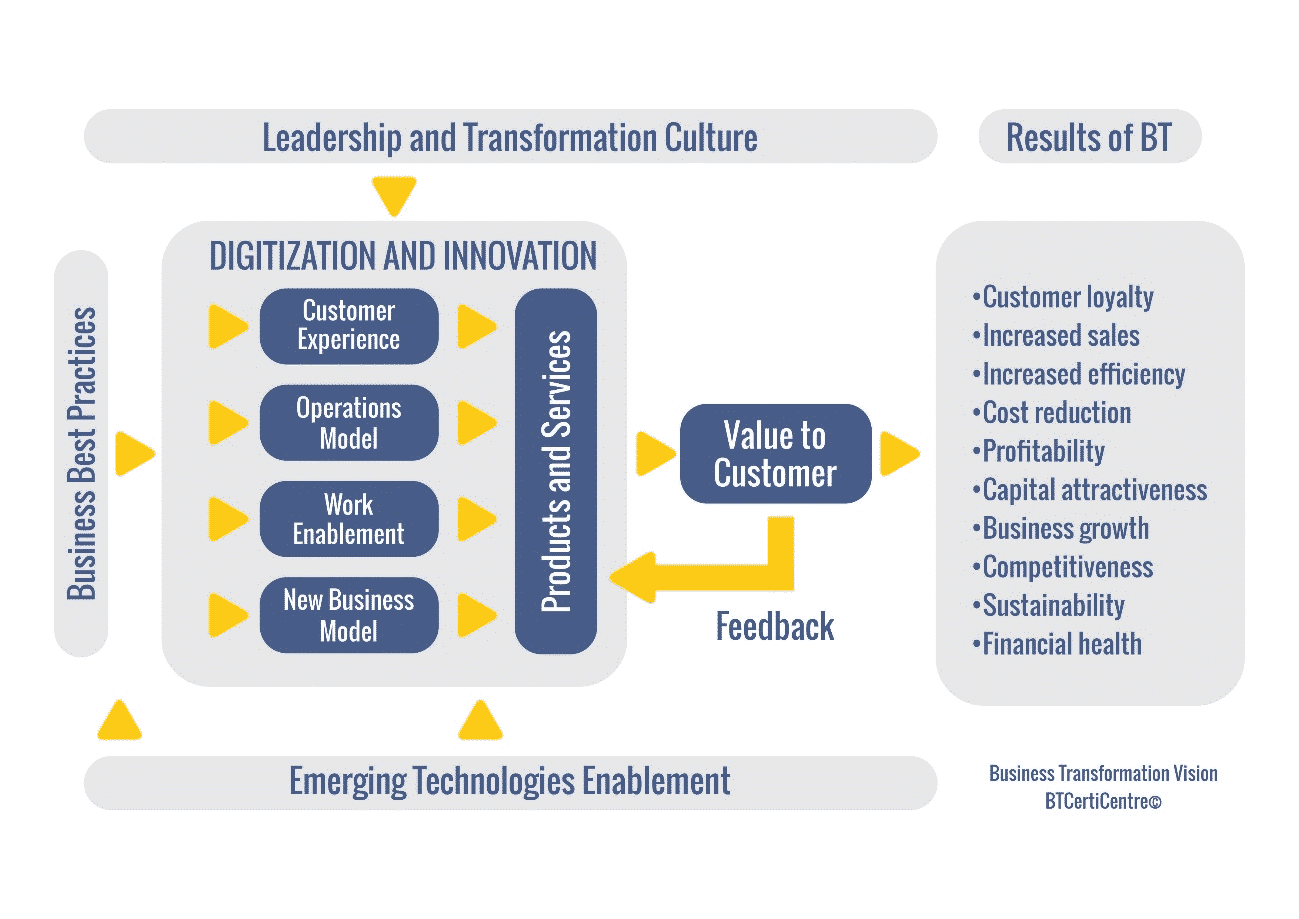
Look at this picture below. This model is what we mean by business transformation.

What is this model intended to show?
That the business transformation has as its primary objective to continuously generate value for the customer and consequently to obtain customer loyalty, increase sales, increase the efficiency of operations, reduce the cost of the business, be profitable, attract capital, make the business grow , be more competitive, sustainable and financially healthy.
To do so, we need to understand that the best practices of making the business work support the four domains where transformation actually takes place. Therefore VUCA management approaches, Agility, Lean, Lean Manufacturing, Digital Marketing, among others support these transformation domains.
However, the real transformation depends on strong leadership and sometimes the change in the organization’s culture and, and on technologies that enable the digitization of these four domains, taking the business to another level of efficiency and fully inserted to meet market demands where most people are fully digitized.
Therefore, technologies such as Robotic Process Automation, Artificial Intelligence, Augmented Reality, Advanced and Collaborative Robotics, Analytics, Machine Learning, Data Management, among others, form the basis of the digitization of transformation domains. Integrated management systems encourage the best way to execute the best business practices and are equally important.
As for the domains of transformation, we understand it as follows:
Customer-experience: refers to the entire relationship that the customer has with the company and with the business. Mapping the customer experience, improving that experience, and adopting customer-centric organization practices enable a major transformation in customer experience management and relationship. Once this domain is supported by e-commerce technologies, CRM, analytics, Big Data, it can further enhance this relationship by creating the bases for loyalty, increased sales, etc.
• Operations Model: refers to the company’s operating model, considering inbound logistics, manufacturing, processing, outbound logistics, supply chain management, channels management, that is, everything that happens from a customer’s order to the delivery of the service or product. This domain supported by new technologies such as robotics, augmented reality, virtual reality, digital twins, simulations, 3D printing, supervisory systems allows the digitization of various stages of the operating model contributing to greater efficiency in the operation, with lower costs, increased productivity and the quality of products and services.
• Work enablement: refers to the digital workplace model and associated technologies that allow people to work remotely while maintaining productivity. It also allows for new organizational arrangements supporting the operation of self-organized teams, as well as supporting an environment of collaboration, creativity and innovation. Makes the organization more agile.
• New business models: it is the total transformation of the business through digitization. Rent rather than sell, sell by subscription, on demand, exploit the long tail of the business, derive the business to explore opportunities and base the business on a digital platform.
The combination of best business practices, enabling technologies, leadership and the organization’s cultural issues, acting on the four domains of transformation, generate the products and services that the customer wants to acquire.
Business is increasingly going digital with physical products with built-in intelligence, fully digital products, and digital platforms and ecosystems facilitating knowledge and business exchanges between those ecosystems.
Finally, this entire architecture has to exist to continuously generate customer value.
According to this framework that represents our vision, the BCerttiCentre certificates are based. In this way, we can lead professionals involved with Business Transformation and Digital Transformation to another level of knowledge that can, in fact, contribute to the transformation of their clients’ businesses or companies in which they collaborate.
It brings benefits for you, for the evolution of your professional career, for your company or your clients.
Use this space to request additional information or ask for assistance
Based in Canada we provide professional certifications in Business Transformation for the whole world.
Copyright 2021 – Business Transformation Certification Centre ©